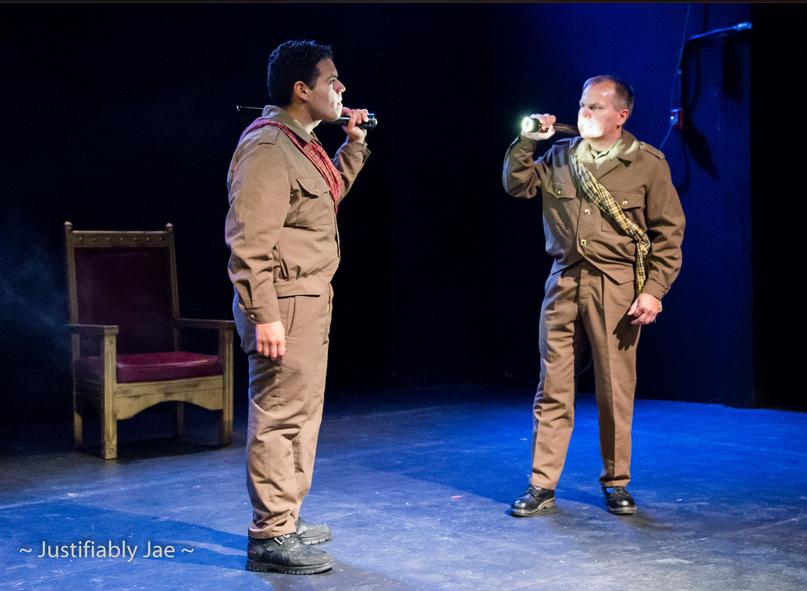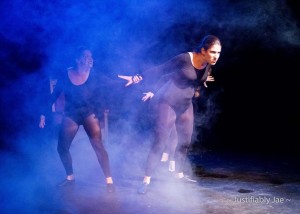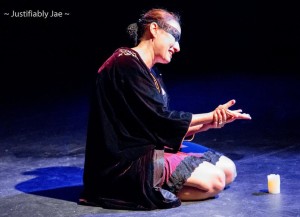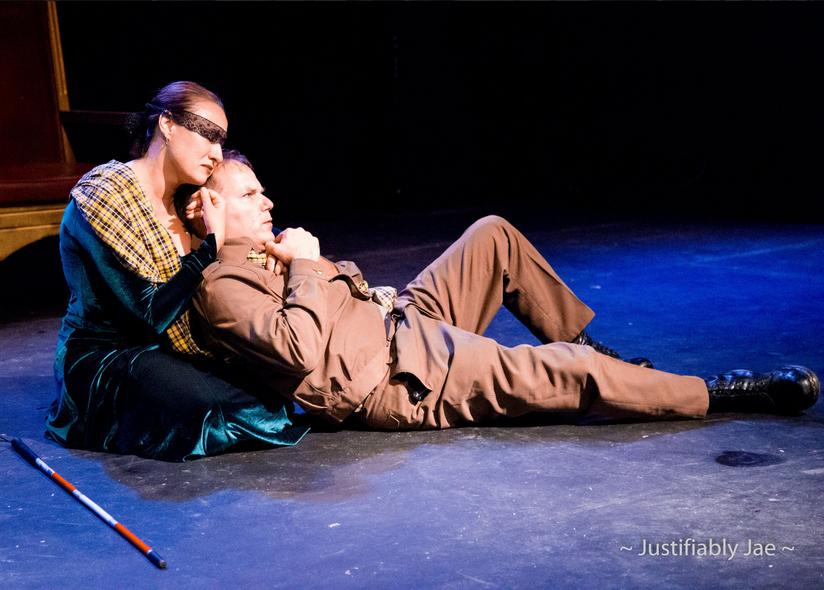Light and darkness make fools both of the eyes. But it is oft better to live in the bliss of darkness than in the harsh intelligence of the light for once a thing is known and learned it can never be unknown. The Rude Mechanicals illustrate this concept with exception as their bring their 2014 Capital Fringe Festival production of Shakespeare’s Macbeth: The Instruments of Darkness to the Greenbelt Arts Center for a limited five show engagement. Directed by Joshua Engel, this production presents the infamous tragedy in a striking new light.

Director Joshua Engel takes the notions of ignorance in darkness one step further by creating a foil to the theme in Lady Macbeth. In a fascinating approach to diminish the generally explosive character, Engel presents Lady M as blind. At first the character choice seems random and unfocused, but as the play progresses it becomes painstakingly clear that she is the inverse representation of the show’s central conceit; one born in ignorance can forge knowledge in darkness, never needing the light for enlightenment.
Engel has cleaved the essence of the story’s plot and other themes down from four acts into 75 minutes. While Shakespearean purists may find this approach unsettling, the fact remains that the story in its essential entirety is delivered in this time-frame. With only 12 actors, Engel does a remarkable job of trimming the Bard’s excess into a workable format for his concept. There are never moments when the plot itself feels rushed or the character development feels cheated.
That said, there are places where a bit more elaboration and expounding upon certain elements could have stood to help his production. The main issue is the infusive doubling of the witches. Three woman— who in essence become a host of other characters like the murderers, Lady M’s chamber maids, and the wounded soldier and company from the beginning of the play— serve as the representation of the witches. There are moments occasionally peppered throughout the production where these three women jump quite quickly from being an alternative set of characters into the witches and back and at times the transition is not as effective as it could be. The scene that comes to mind is during the attack on Banquo and Fleance. In a longer production, where the witches have more time in these moments, this concept could be more fully executed to its brilliant potential.

The other major issue with the production is the underscored soundscape. Sound Designer Eric Honour creates original orchestrations to compliment the tension built into the scenes by Engel and the actors, but most of these arrangements are played too softly and go unheard. There are times when the music sounds like background distraction because it is unclear if it is meant to be playing or left on by mistake. In adjusting to the new venue, from the Fringe adaptation, this is problem that will no doubt resolve itself before the end of the run.
Costume Designer Moira Parham crafts care into her construction of the costumes, again finding weaving symbolism into her design work. Parham outfits the Macduff clan with bright green and gold-accented sashes, the complete opposite of the traditional, albeit faded, tartan beige sashes used to represent the house of Macbeth. It’s Parham’s rags for the witches that make her genius clearly visible. Knowing that the trio of fates can see the future and know the inevitable ruin that is to come, Parham outfits them in blood-faded tartan shreds of fabric— the most literal representation of the play’s bloody end as if they traveled into the future and returned wearing its remnants.
The other absolutely striking creative element about the production is the fighting. Choreographed by Erin MacDonald, Engel’s vision of bloody battle comes to fruition with some of the sharpest and cleanly executed moves to be witnessed in any area Shakespearean production as of late. The simplistic yet effective routines inlaid by MacDonald give the audience a healthy dose of believable violence; the perfect notion for rounding out this flash-version of the Scottish tragedy.

The same is said of Banquo (Marlowe Vilchez) whose role has been whittled down to fit the shortened format of the production. Vilchez’ performance is striking for how little time his character appears in the show. Ironically enough it is after his imminent death that he becomes most noticeable; a gory representation of text drawing to life from description to reality. Ross (Holly Trout) and Malcolm (Evan Ockershausen) also make their presences felt during their brief exposures to the stage, particularly Trout with her discovery of Duncan. It becomes a company effort to make each of these roles still feel realistic in the truncated version of the play; an effort at which they succeed greatly.
Macbeth (Alan Duda) is being portrayed the likes of which have never previously been seen. Under Engel’s carefully calculated direction, Duda unveils the uncertain ground upon which the character is always standing. There are moments of intense emotional outburst that do shake through the character, but ultimately the audience is left experiencing a subdued version of the title character. This is not to say that Duda performs poorly, though at times he does appear briefly lost inside the character’s mind. Boldly forcing a shift in focus from Macbeth to Lady Macbeth with this approach, Duda allows Macbeth to have a softness within him, making his peril a much more sympathetic journey; in essence humanizing the character.
As for Lady Macbeth (Jaki Demarest) the tables are turned entirely. One might think that with Macbeth being played with subtly and humanity that this might exponentially further the madness and extreme outbursts with which Lady M is played. Demarest is a stricken woman who portrays the character’s deep seeded— and oft well hidden— insecurities in their full honesty.

It is a fascinating concept, with well-rounded performances, and intriguing notions of thematic layered thoroughly throughout; well worth venturing out for. Don’t miss the limited revival engagement this summer.
Running Time: Approximately 75 minutes with no intermission
Macbeth: The Instruments of Darkness plays through August 23, 2014 at The Rude Mechanicals Greenbelt Arts Center— 123 Centerway in Greenbelt, MD. For tickets call (301) 441-8770 or purchase them online.

